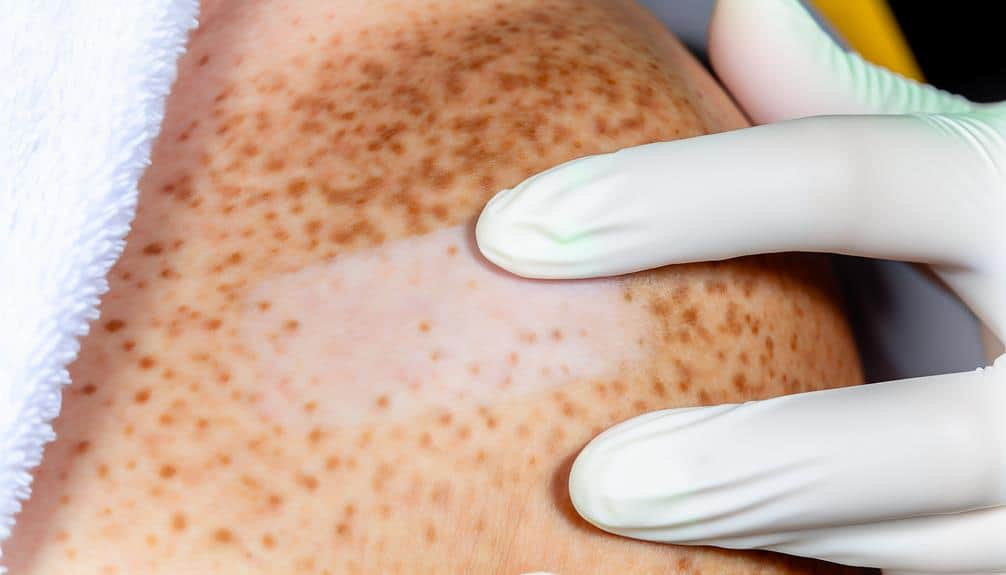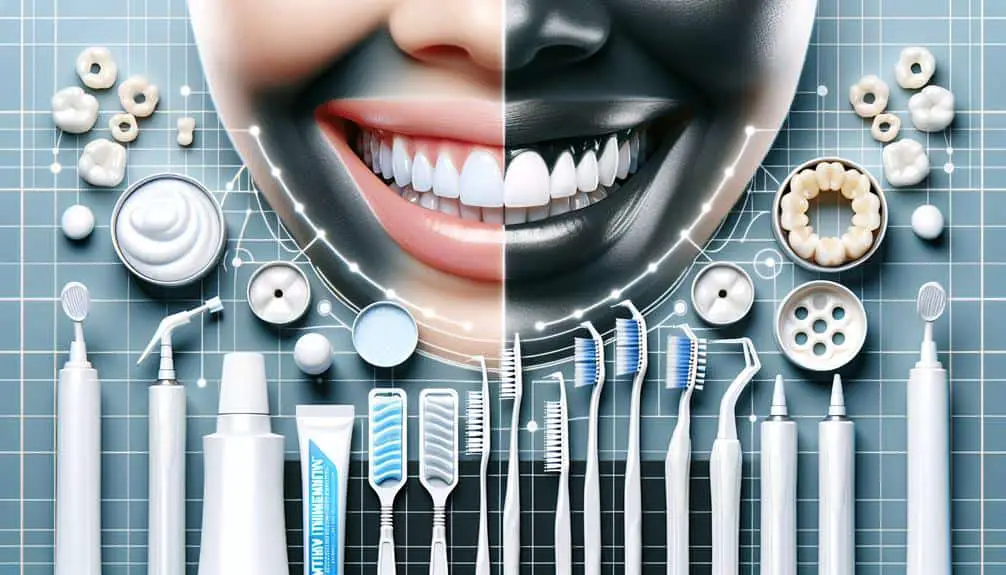Opting for professional whitening tips is best for dark spots because they offer quick and targeted treatments, such as laser therapy, chemical peels, and microdermabrasion, tailored to your specific needs. These methods break down melanin deposits, improve skin texture, and lighten dark spots efficiently. Factors like sun exposure, hormonal changes, and genetics contribute to dark spots, but professional whitening provides a more potent and focused solution.
Implementing proper oral hygiene practices and following safety measures during treatment are essential for maintaining whitened teeth and ensuring peak results. Explore the detailed benefits of professional whitening for dark spots to achieve the best outcomes.
Key Points
- Professional whitening offers potent and targeted treatments for dark spots.
- Administered by trained professionals for safe and efficient results.
- Tailored to specific needs, addressing individual concerns effectively.
- Ensure quick and visible results, enhancing skin appearance.
- Utilize advanced techniques like laser therapy to target and lighten dark spots.
Benefits of Professional Whitening
Professional whitening offers a highly effective solution for addressing dark spots on the skin, providing noticeable results in a short period of time. When considering the benefits of professional whitening, one of the standout advantages is the quick results it offers. Unlike many over-the-counter products that may take weeks or even months to show improvement, professional whitening procedures can lead to visible changes after just one session. This makes it a cost-effective solution in the long run, as you may require fewer treatments to achieve the desired outcome.
Additionally, professional whitening treatments are often more potent and targeted than at-home remedies, ensuring a more efficient approach to lightening dark spots. The expertise of trained professionals in administering these treatments also minimizes the risk of adverse effects and guarantees that the process is tailored to your specific needs. With the combination of quick results and cost-effective solutions, professional whitening emerges as a compelling option for addressing dark spots effectively.
Factors Affecting Dark Spots
Dark spots on the skin can be influenced by various factors, including sun exposure, hormonal changes, and skin injuries. Sun exposure plays a significant role in the development of dark spots, as UV rays can trigger melanin production, leading to hyperpigmentation.
Genetics also play a part, as some individuals are more prone to developing dark spots due to their genetic makeup. Hormonal changes, such as those experienced during pregnancy or menopause, can also contribute to the formation of dark spots.
Additionally, skin injuries like acne or inflammation can leave behind pigmented marks that evolve into dark spots over time. Proper skin care is essential in managing and preventing dark spots, as using sunscreen, antioxidants, and exfoliants can help reduce their appearance.
Understanding these factors influencing dark spots is pivotal in developing effective treatment and prevention strategies for achieving clearer and more even-toned skin.
Professional Whitening Techniques
Understanding the various techniques available for whitening dark spots professionally can greatly enhance your efforts in achieving a more even-toned and radiant complexion. When it comes to professional whitening techniques, there are several options that dermatologists and estheticians may recommend:
- Laser Therapy: This method uses focused light to target and break down melanin deposits in the skin, helping to fade dark spots effectively.
- Chemical Peels: These peels contain specific ingredients like glycolic acid or salicylic acid that can exfoliate the skin and reduce the appearance of dark spots over time.
- Microdermabrasion: By gently removing the outer layer of skin, this technique can help lighten dark spots and improve overall skin texture.
While these professional methods can yield significant results, it's crucial to be mindful of DIY alternatives and dispel common misconceptions about at-home treatments for dark spots.
Professional whitening techniques offer a more controlled and potent approach to addressing stubborn dark spots, ensuring a safer and more efficient process for achieving a brighter complexion.
Tips for Maintaining Whitened Teeth
To maintain the brightness of your whitened teeth, it's important to implement proper oral hygiene practices consistently. Daily habits play a vital role in preserving the results of professional whitening treatments. Brush your teeth at least twice a day with a fluoride toothpaste to remove surface stains and plaque buildup. Flossing daily helps prevent discoloration between teeth and along the gumline. Rinse with an antiseptic mouthwash to reduce bacteria that can cause staining. Additionally, avoid foods and beverages known to stain teeth, such as coffee, tea, red wine, and dark berries.
Preventive care is key to ensuring your whitened teeth stay bright. Regular dental check-ups and cleanings are essential to remove any tartar or stubborn stains. Your dentist may recommend touch-up whitening treatments to maintain your desired shade. Using a straw when consuming staining beverages can help minimize contact with your teeth. Lastly, consider quitting smoking as tobacco products can lead to yellowing of the teeth. By incorporating these practices into your routine, you can prolong the effects of professional whitening and keep your smile radiant.
Safety Measures for Whitening Treatments
Maintain the safety and effectiveness of your whitening treatments by prioritizing proper precautions and following recommended guidelines. When undergoing whitening treatments, it's vital to guarantee your safety and minimize potential risks. Here are some essential safety measures to bear in mind:
- Safety precautions: Before starting any whitening treatment, consult with a dental professional to assess your oral health and determine the most suitable whitening option. Follow their recommendations closely to avoid adverse effects.
- Treatment duration: Adhere to the specified treatment duration provided by your dentist or stated on the whitening product. Overusing whitening products can lead to tooth sensitivity and damage to the enamel.
- Protective measures: Use protective barriers, such as dental dams or custom trays, to prevent the whitening agent from coming into contact with your gums and soft tissues. This helps prevent irritation and ensures targeted treatment on the teeth.
Frequently Asked Questions
Are There Any Alternative Methods for Treating Dark Spots Besides Professional Whitening?
For dark spots, natural remedies like lemon juice or skincare products with ingredients like vitamin C can help. DIY treatments, such as masks with ingredients like turmeric, may also aid in reducing dark spots.
How Long Does It Typically Take to See Results From Professional Whitening Treatments for Dark Spots?
For dark spots, professional whitening treatments typically show results within a few weeks to a few months. Testimonials often highlight the effectiveness of these treatments, showcasing impressive before and after comparisons that demonstrate visible improvements in skin tone.
Can Professional Whitening Treatments Cause Sensitivity or Damage to the Teeth?
Professional whitening treatments can potentially cause tooth sensitivity. However, with appropriate precautions and expert supervision, the risks can be minimized. It's crucial to adhere to post-treatment care instructions to safeguard your teeth and achieve the best possible outcomes.
Are There Any Specific Dietary or Lifestyle Changes That Can Help Prevent Dark Spots From Reoccurring After Professional Whitening?
To prevent dark spots after professional whitening, consider dietary changes like reducing consumption of staining foods/drinks and increasing water intake. Adopt lifestyle habits such as regular brushing and flossing, and using whitening toothpaste to maintain results longer.
How Often Should Someone Get Professional Whitening Treatments to Maintain Their Results?
To maintain your whitening results long term, it's advised to get professional whitening treatments every 6-12 months. Regular touch-up sessions can help uphold the effects of the initial treatment and make certain your smile stays bright.



